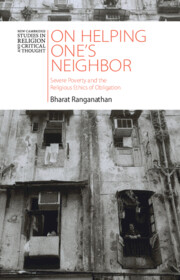
- Publisher:
- Cambridge University Press
- Online publication date:
- April 2024
- Print publication year:
- 2024
- Online ISBN:
- 9781009428231
Last updated 10th July 2024: Online ordering is currently unavailable due to technical issues. We apologise for any delays responding to customers while we resolve this. For further updates please visit our website https://www.cambridge.org/news-and-insights/technical-incident


Exploring what he calls 'the moral horror that is severe poverty,' Bharat Ranganathan develops a demanding account of the obligations that affluent people have to assist severely impoverished people. He argues that this is an immediate ethical as much as a social or structural imperative. Noting that developmental economists and moral and political philosophers have focused on wealth inequalities in increasingly sophisticated ways, Ranganathan observes that – within religious ethics – normative issues around severe poverty have nevertheless received insufficient attention. Bringing together general moral, religious, and philosophical principles with particular economic, social, and political realities, and engaging constructively with the writings of John Rawls and Peter Singer, this passionately argued book boldly challenges deleterious trends within ethics by unpacking, in a much more systematic way than hitherto, the pressing dilemmas around acute impoverishment. It will find an eager readership among scholars of religion, ethics, developmental studies, and theology.
‘The topic is often raised by religious ethicists but has rarely been treated with this amount of depth or focus. Bharat Ranganathan has produced an outstanding book on the subject, one of great importance that will provoke further conversations on the moral obligations of the affluent to those living in extreme poverty.'
Nichole M. Flores - Associate Professor of Religious Studies, University of Virginia
‘Bharat Ranganathan's well-written and carefully argued book is the most sustained discussion yet published of the pressing topic of severe poverty which draws on religious ethics. It represents an important (though increasingly less prominent) tradition of joining Christian ethics and religious philosophy.'
Eric S. Gregory - Professor of Religion, Princeton University
 Loading metrics...
Loading metrics...
* Views captured on Cambridge Core between #date#. This data will be updated every 24 hours.
Usage data cannot currently be displayed.